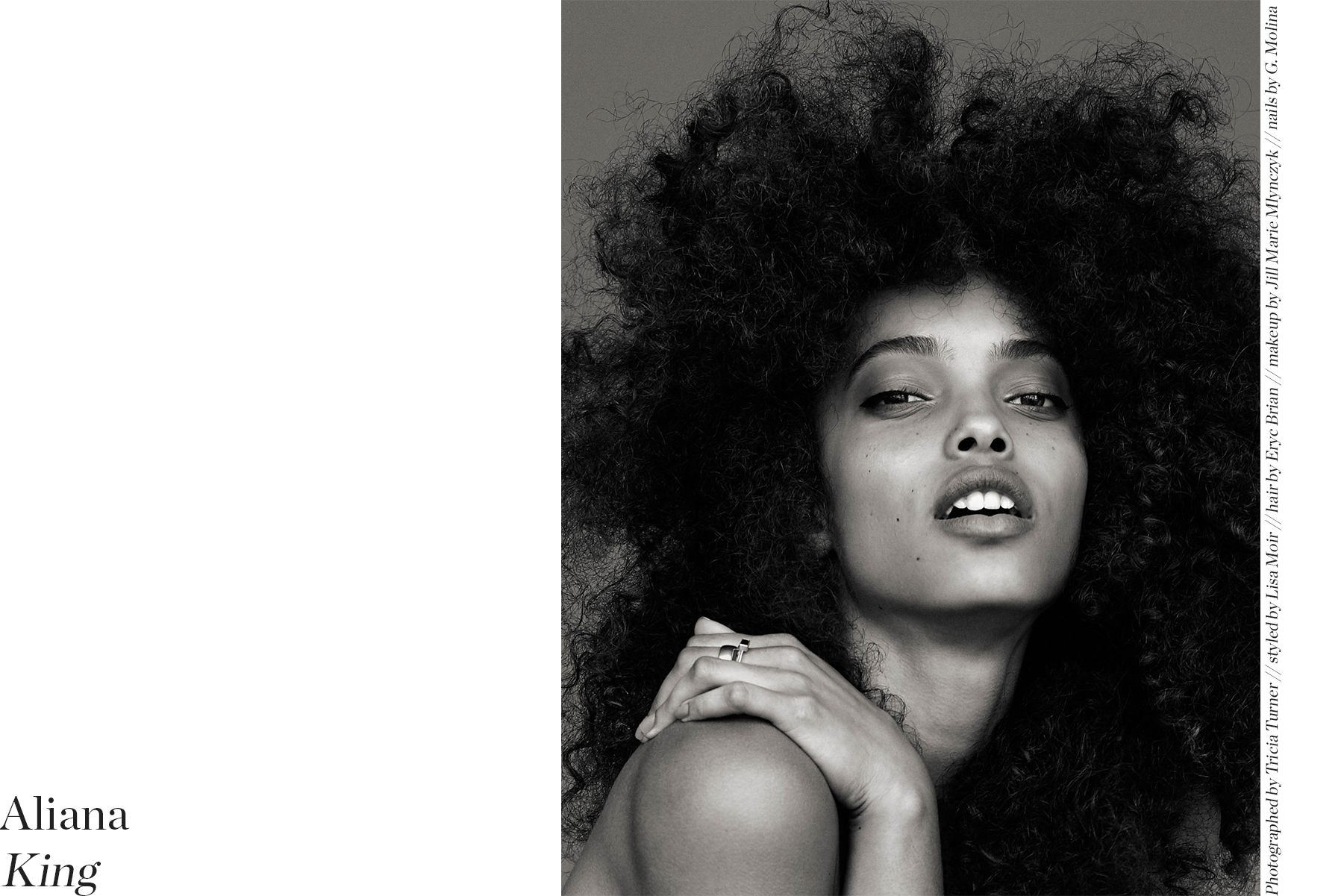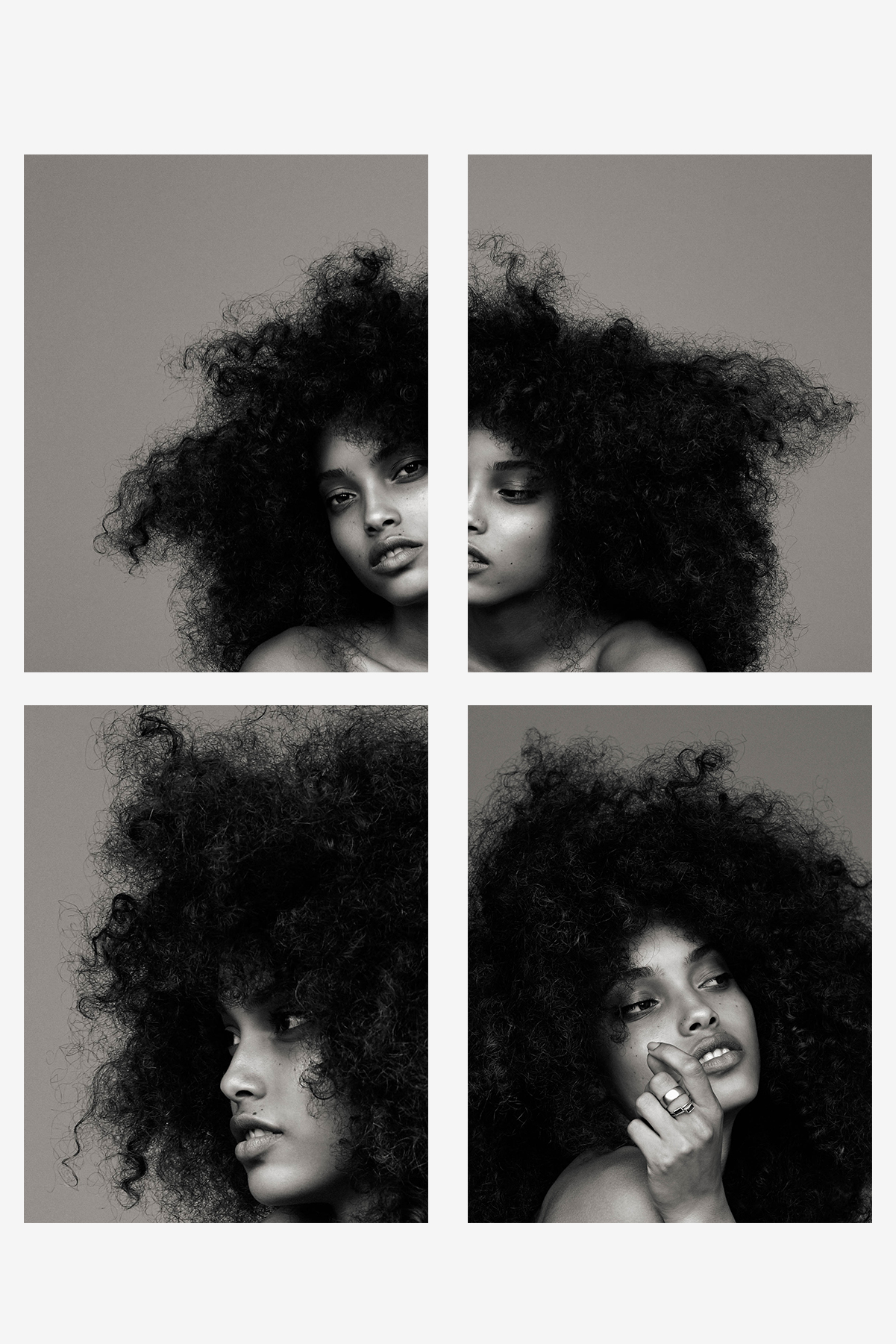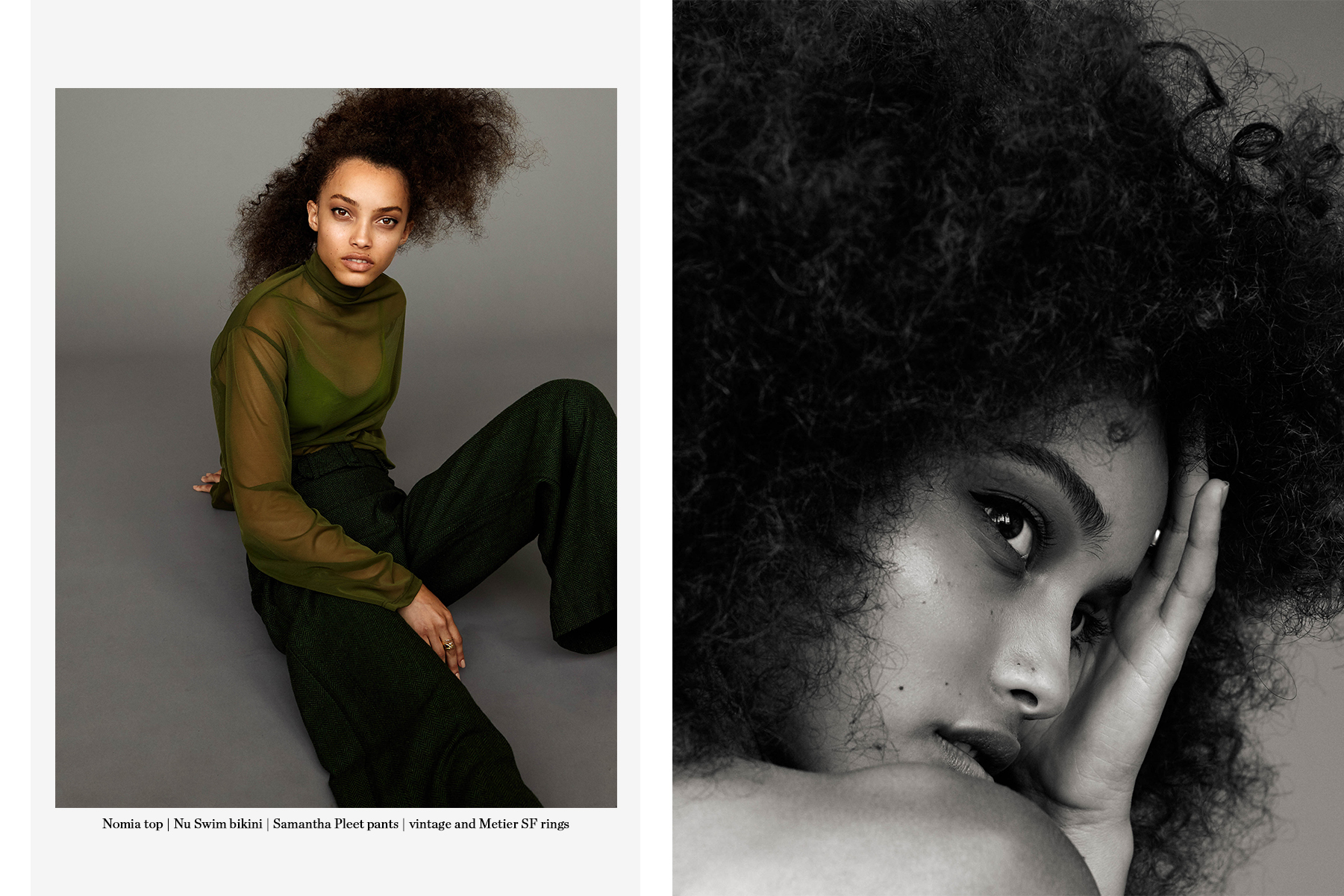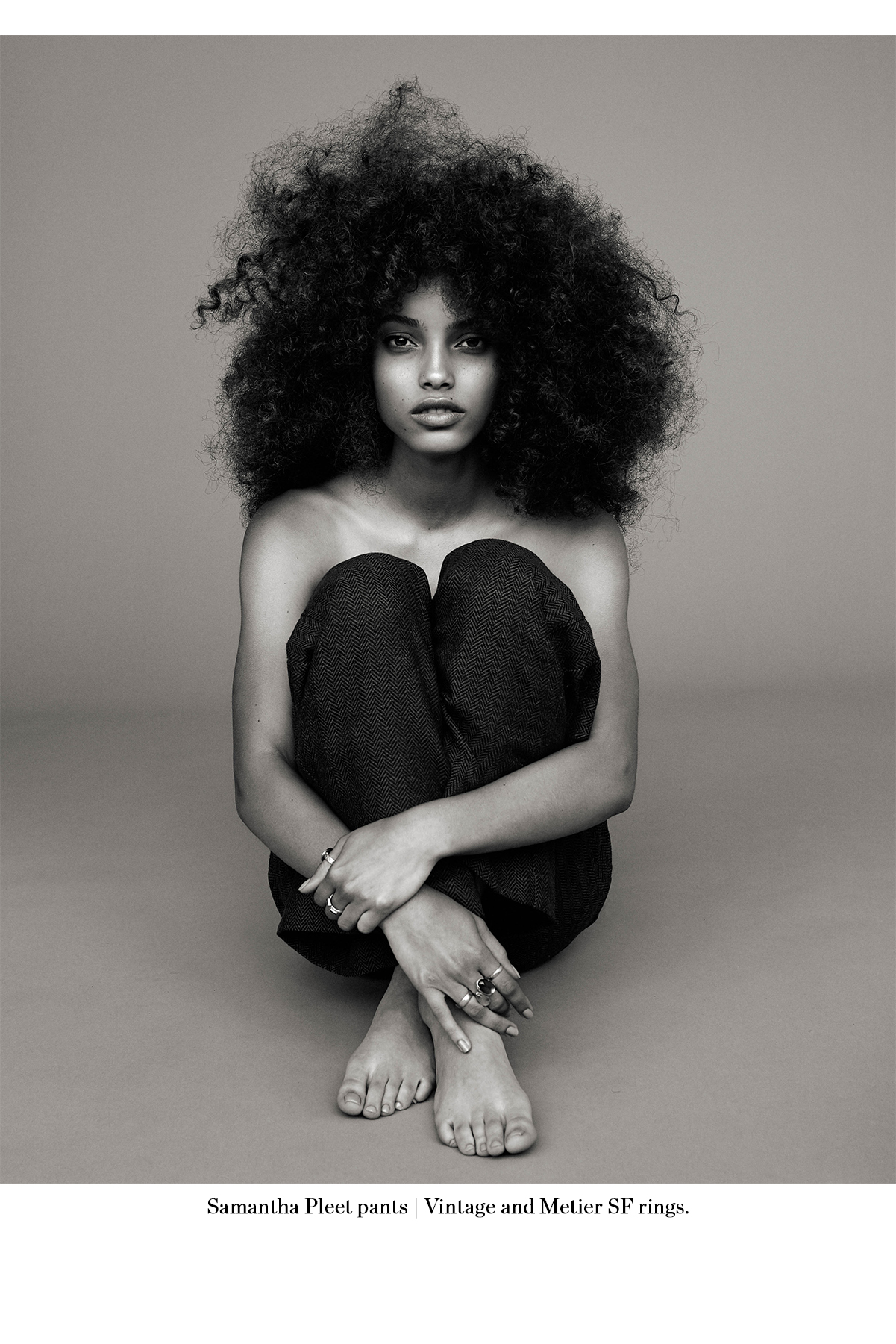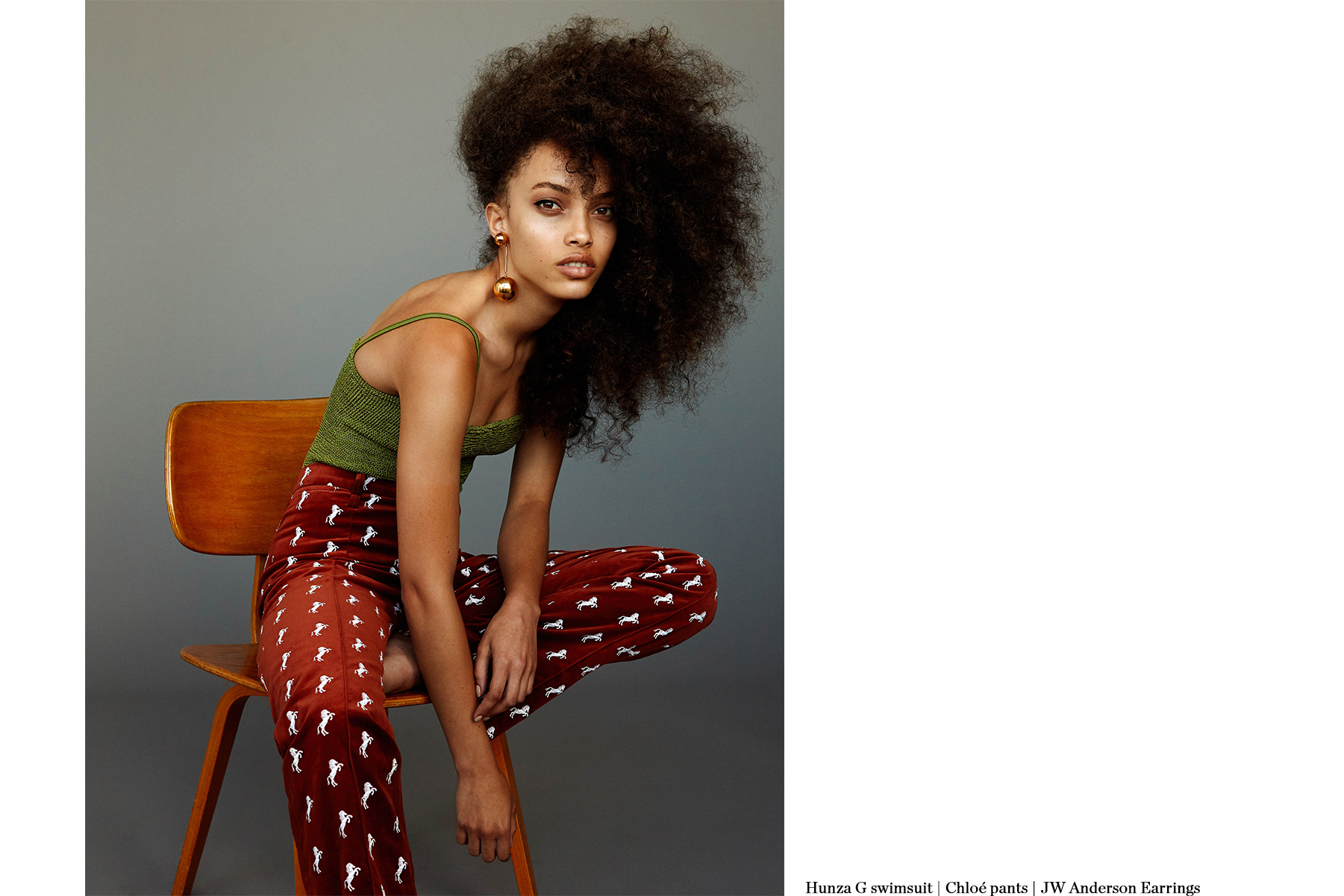Aliana King 18, 5’4, and has a head full of curls. Short by model-card standards, BUT as the pictures (lensed by TOMBOY reg’ contributor, Tricia Turner) prove, there’s nothing standard about Aliana. We shot together during King’s short stint in LA where she is based, though spends a lot of time between New York, and London. Her hometown is the island of Bermuda, which she left behind to model.
Here we talk the usual… beauty, personal style, passion and ambition. But also to topics like #metoo and black representation in the fashion and beauty industry. As a growing human in the media industry, I can often find this subject matter tricky to navigate, I am after all learning, and am both proud and terrified of that fact. BUT Aliana’s genrosity of spirit and speaking her truth, made me feel at ease, kind of like sharing a tea with a friend, and tackling all of the world’s problems together.
ASL:
18, Female, Currently: Los Angeles
TB: How did you get discovered?
AK: I was 17 when I got discovered by my mother agent, on Instagram, but I have been modelling with Bermuda Fashion week since I was 15.
TB: What’s Bermuda like to grow up in?
AK: So different from LA. It’s very laid back and slower paced. I lived a two-minute walk from the nearest beach, so there’s a lot of swimming, water sports and going on boats. The neighbourhoods are super family oriented and it’s extremely safe, no guns are allowed. It’s a really great environment to feel grounded in. I miss it so much, but there is no fashion industry there, so I have to be away in order to do my job.
TB: What have you learnt from modelling so far?
AK: I’ve learnt a lot. Before I started modelling I was very dependent on my parents and my sister, I’d never travelled alone or been away from home for longer than a couple of weeks on my own and modelling was the first thing that took me out of my comfort zone and taught me how to be adaptable and independent and I learned so many things about both the world and myself, and things outside of Bermuda because you can tend to be a bit small-minded when you’re living on an island, it’s all the same thing everyday, 21 square miles, not much to do.
TB: What drives you?
AK: I love modelling, and I really enjoy it and am passionate about it but I think that right now the thing that drives me the most is the influence that I am able to have on others. When I first started modelling I was just doing it for fun, but now I’m one of three international models from Bermuda, and there are tons of other girls who have curly hair or who are shorter too and want to become models who are from Bermuda but haven’t thought that there was a space for us in the industry or didn’t know that there was a way to do it. Through this, I’ve gotten so many wonderful messages from young Bermudian girls that I’m their role-model and a great influence on them and that’s something that drives me now, not only modelling but to be a positive influence.
TB: Is it important to you to have further representation and visibility for your look in the industry?
AK: Definitely. and not just specifically being short and having curly hair, but a lot of the time when you look at the industry, it’s tall, skinny, white models who look exactly the same and I think that people who look at that and feel that they are different, for example, if you’re plus-sized, or are dark-skinned or have curly hair, that it might prevent them from making it in the industry. For me, it’s important to show that you can have a difference and you can not be a conventional model but still be extremely successful in the industry and do wonderful things regardless.
TB: Have you experienced any issues or stigma with your natural hair while working?
AK: So often. All the time. There are so many really talented hair stylists who do know what they are doing and can handle curly hair, and so many who really know how to do straight hair, but a lot of the time, they have no clue how curly hair works, how to make it look natural and not frizzy is really important. There is such a specific way in handling curly hair, and if you just don’t know, then lots of them will try and end up messing it up or giving you heat damage, especially when heat is put on it in the wrong way, your curl pattern will end up getting messed up, or you can lose texture.
TB: How do you deal with being on a job with a hairstylist who doesn’t know how to work with natural hair?
Basically, I just gained confidence through that, that I can’t just let anyone do whatever they want with my hair. So when I’m on set now, I make sure that if they don’t know what they are doing, and you can normally tell, then I’ll offer to do it myself and if they say no, I’ll just tell them that what their doing will damage my hair. My hair is my brand, and how I book jobs, I can’t afford to lose it, nor do I want to. Models often don’t think that they have a choice with this sort of stuff, but if you speak up, even if there is a problem with the hairstylist, speak to someone else, speak up.
TB: When you’re not modelling what are you doing?
AK: I’m taking classes online at the moment, and my first love has always been animation and art, so I love to be creative, I also have a ukelele, so I love playing that and singing. When I’m not doing that I’m probably binge-watching Netflix shows.
TB: What classes are you taking?
AK: I’m taking English and math just to get a regular degree, but this past year I’ve been in school getting a degree in animation. But at the moment I’m just working towards the general degree so that I can finish the animation degree.
TB: What’s the best and hardest thing about being a woman in 2018?
AK: I think the best thing is the amount of support we are getting from social media and the technology that we have nowadays, it’s easier for us to be heard. We have a bigger platform to speak on, and it’s acceptable for women to speak up. For example, the March For Our Lives movement was basically lead by Emma Gonzales, who is now the face of. huge movement and she’s a young woman. Stuff like that wouldn’t happen years ago, and I think that the demand for equality and respect is so much higher in 2018. It’s the best time for women to thrive. The worst thing is that although so much progress has been made, there is still so much more to be done. There are so many double standards with men and women and the wage gap is still prevalent and misogyny is REAL and we are still fighting for equality. If we get too comfortable with the progress we’ve already made and we don’t keep on going, we won’t get to where we are supposed to be. Toxic masculinity is always so in our faces, I often feel like no matter how hard we try that will always be there. There will always be men who feel that they deserve to be paid more, or who think that we need to be responsible for our safety in how we dress and carry ourselves. This is why we can’t get too comfortable because we literally can’t. I don’t believe complete equality is really possible, but I do believe we can get pretty far if we continue to work together.
TB: With the talk of toxic masculinity, and in a post #metoo world, do you feel like that is something that you personally feel is still happening within your industry?
AK: Definitely. And there is another great movement that’s lead by a woman. before I was in the industry I saw men asserting their masculinity, so I knew that it was a thing, but once I started working I realised how bad it actually was. It’s so much worse. I find it very difficult, and let me preface that not all male models are like this and I know they can experience assault/abuse too, but it’s often so difficult to be around male models just because they are for lack of a better word, cocky, and I can’t stand watching them have to assert their masculinity, let alone everyone else.
TB: Something that you wish more women would do?
AK: There is always a lack of confidence in women. When it comes to their bodies and their looks. I believe that a confident woman is a powerful woman. It’s so important for women to progress in society, because if you don’t believe that you’re capable of the same thing that men are capable of, then nobody else will believe that too.
TB: What does beauty mean to you?
AK: When people talk about beauty it often relates to the physical, but I truly believe that beauty is so much deeper. When you look at a person and they are beautiful physically, that’s just a first impression. But it’s not until you get to know someone do you see their true beauty, in their personality, their intelligence, their kindness, their confidence. those are the things that make you truly beautiful regardless of age.
TB: Something that you wish the beauty/fashion industry had more of?
AK: Coming from my perspective, I think that we need shorter models in the fashion industry, and we need more plus-sized models. People always ask me how I can be a model because I’m only 5’4. The average sized person in America is 5’4, not 5’11. When models are presented as THAT tall and THAT skinny, it’s not even possible for the majority of women, so why are we still promoting it? if people see more of themselves within the beauty and fashion industry, it’s more likely to increase women’s confidence.
TB: Do you feel that black models are represented in the industry?
AK: I think that there are so many problems when it comes to representing black models and getting rid of the European beauty standard. I know that I’m often cast with a group of models, for example, a white, blonde girl, a white, brunette girl, an Asian girl and then me. I’m light skinned, and I have curly hair, so it’s like, they want just enough blackness for them to seem PC. There have been so many times where I’ll be in a group shot and then get pulled out of the shot and I ask what’s wrong, and they have told me that they are just shooting for a different demographic. It’s like, they do so much to seem diverse, but just enough to give people what they want, but not too much that will make them uncomfortable.
TB: What’s next for you?
AK: In terms of modelling, what I would love to do is bring it back to Bermuda. There are so many beautiful models who do Bermuda Fashion Festival and want to go further and get signed and work internationally but they don’t know how to do it because there are no agencies or scouts or anything. People just get their cousins to do photoshoots for their local businesses. Of course, I’m going to continue to pursue modelling and build my name, but I also want to give back to Bermudian models and help them get further in the industry too.
TB: Who is Aliana King?
AK: If you google me, you’ll get that I’m a 5’4, model from Bermuda who is trying to break standards. But I’m also happy, friendly, an artist, a cool person, etc. When I’m talking about myself though and my true self, I have so much room to grow and I’m still figuring out who I am as a person, I mean I’m 18 and I’m just starting out in the industry, i’m just trying to figure out who I am and what I’m meant to do with all this. as long as I’m happy and have god with me and am happy with my work, I don’t feel like I really need to know yet.
Photography: Tricia Turner
Styling: Lisa Moir
Makeup: Jill Marie Mlynczyk
Hair: Eryk Brian
Nails: G. Molina
Model: Aliana King @ LA Models
Words and Art Direct: Ella Jane

